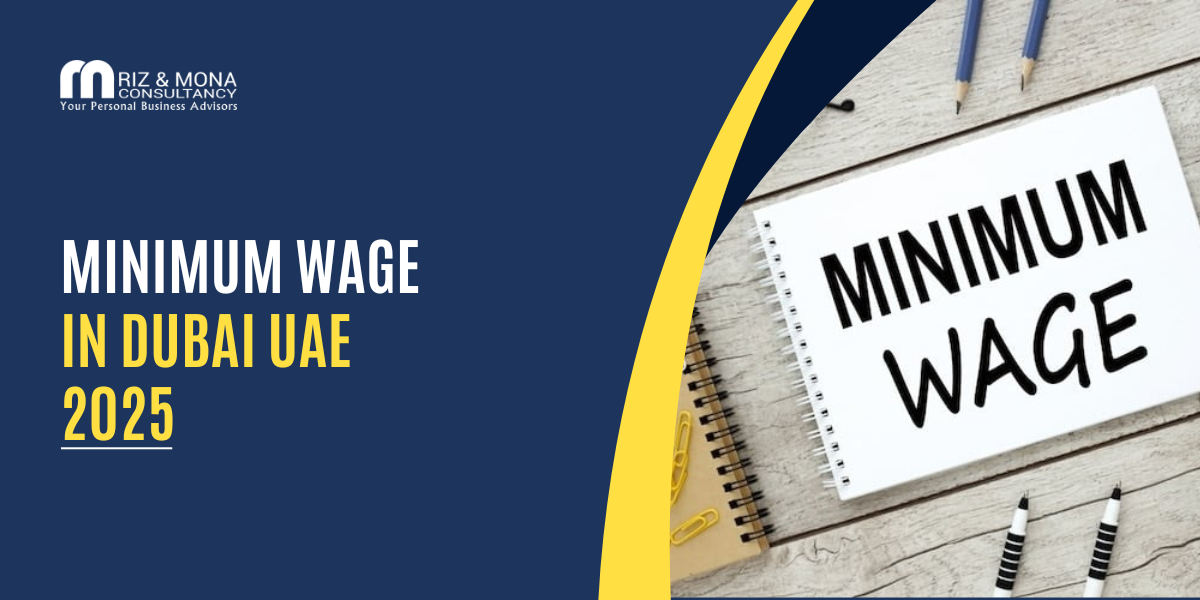Wage Protection and Regulations in the UAE (2025)
Key Provisions Under the New Labor Law:
Wage Protection System (WPS)
A critical tool that ensures wages are paid electronically through accredited banks, offering greater transparency and guaranteeing that employees receive their payments on time and in full.
Wage Safeguards
Employers are required to pay full basic salaries along with any allowances promptly, ensuring compliance with minimum salary requirements.
Anti-Discrimination Measures
The law prohibits wage discrimination based on gender, nationality, or other factors, ensuring fair wages for all employees.
Penalties for Violations
Employers failing to adhere to wage regulations face fines and other penalties for non-compliance with minimum wage laws or delayed salary payments.
Start Your Business Journey with Our Professional Support!
UAE Wage Policies: Guidelines, Challenges, and Improvement Strategies
While the UAE does not have a national minimum wage, certain sectors have established salary guidelines to ensure fair compensation for employees in specific industries.
Examples of Sector-Based Salary Guidelines:
- University Graduates: AED 12,000/month
- Skilled Technicians: AED 7,000/month
- Skilled Laborers: AED 5,000/month
These minimum wages across sectors ensure that employees in fields such as healthcare, engineering, and finance are fairly compensated, making the UAE an attractive destination for skilled professionals.
Despite the comprehensive wage regulations in place, challenges remain in fully implementing wage protection across all sectors. These challenges include:
-
- Variation in Wage Structures: Different free zones and industries may have distinct minimum wage standards, leading to inconsistencies in wage practices.
- Enforcement of Labor Laws: While systems like the Wage Protection System are in place, there is room for improvement in monitoring compliance across all industries.
To improve the minimum wage system in the UAE, several steps can be considered:
-
Regular Wage Adjustments: Link the minimum wage in UAE to inflation and cost of living to ensure it remains relevant and fair for workers over time.
-
Sector-Specific Wages: Introduce sector-specific minimum wages per month to reflect the differences in job types and required skills, ensuring workers in all industries are fairly compensated.
-
Enhanced Worker Protections: Strengthen labor laws to ensure that workers not only earn a fair wage but also have access to benefits such as healthcare, paid leave, and job security.
-
Greater Transparency: Encourage employers to be transparent about wages and benefits, fostering an environment of trust and accountability.
-
Public Awareness Campaigns: Raise awareness about workers’ rights and the importance of a fair minimum wage, empowering both workers and employers to contribute to the discussion.
By adopting these suggestions, the UAE could create a more equitable and sustainable workforce, benefiting both employees and employers in the long term.
What should I do if I have wage issues in the UAE?
Average Salaries in the UAE (2025)
Salaries in the UAE vary significantly based on factors like industry, profession, location, and experience level. Salary in Dubai is typically higher than in other emirates, reflecting the city’s elevated cost of living and competitive job market.
Average Salaries by Role
| Role | Average Salary (AED per month) |
|---|---|
| University Graduates | 12,000 |
| Skilled Technicians | 7,000 |
| Skilled Laborers | 5,000 |
| Skilled Professionals | 20,000–45,000 |
| Mid-level Professionals | 10,000–25,000 |
| Unskilled Workers | 1,500–5,000 |
Location-Based Salary Ranges
| Location | Salary Range (AED per month) |
|---|---|
| Minimum Wage in Dubai | 20,000–35,000 |
| Basic Salary in Abu Dhabi | 18,000–32,000 |
| Salary in Sharjah | 15,000–25,000 |
These salary ranges highlight the variation in wages based on industry demand and regional economic factors, with Dubai generally offering higher salaries due to its role as a global business hub.
Recent Amendments to UAE Labor Law
The UAE’s labor law has undergone significant reforms to enhance worker protection and clarify wage guidelines. These updates, effective in 2024, simplify wage payments and ensure broader compliance with the labor law.
Key Changes Include:
- Binding Ministry Decisions: The Ministry of Human Resources can now issue binding decisions to ensure employers follow salary guidelines and pay wages on time.
- Extended Statute of Limitations: Employees now have two years to file wage-related claims, giving them more time to pursue legal action if necessary.
- Introduction of Paternity Leave: Paternity leave has been introduced as a mandatory benefit, aligning with international labor standards and supporting work-life balance.
These amendments strengthen salary protections and ensure that employees in the UAE receive fair treatment and adequate compensation.
Wage Protection System (WPS) Enhancements
The Wage Protection System (WPS) remains a cornerstone of the UAE’s effort to ensure employees are paid fairly and promptly. Recent enhancements to the system guarantee more robust protection for workers’ salaries.
Features of the Enhanced WPS:
- Electronic Wage Transfers: Employers are mandated to pay wages through accredited financial institutions, improving the timeliness and transparency of salary payments.
- Regular Monitoring: The Ministry of Human Resources can now monitor compliance with wage regulations more effectively, ensuring that employers are adhering to salary guidelines.
- Clear Record-Keeping: All salary payments are electronically recorded, which helps resolve disputes quickly and ensures transparency in wage payment practices.
Employee Benefits Under the New Labor Law
The 2024 updates to the UAE labor law introduce several new employee benefits that aim to enhance the quality of life for workers and support their basic needs.
New Benefits Include:
- Maternity and Paternity Leave: Employees are entitled to paid maternity and paternity leave, ensuring financial support during family time without affecting their salary.
- Paid Bereavement Leave: Employees can take paid leave following the death of a close family member.
- Annual Leave Flexibility: Employees now have the option to carry over unused annual leave to the next year or have it paid out.
These additions reflect the UAE’s efforts to create a more balanced and fair work environment, improving the overall wage structure.
FAQS (Frequently Asked Questions)
Does Dubai have a minimum wage?
No, Dubai does not have a national minimum wage. However, there are salary guidelines that differ for various types of workers, which are not applied universally.
How are wages determined in Dubai?
Wages in Dubai are typically determined by employers, and they vary widely based on the type of work. Highly skilled jobs in industries like technology and hospitality can pay well, while wages in certain sectors like manufacturing may be very low. It’s crucial to compare salaries with the cost of living and negotiate with employers.
What is the minimum monthly salary needed to qualify for healthcare in Dubai?
Employers in Dubai are required to provide health insurance for employees, which includes access to public healthcare facilities. Emergency care is available to everyone, regardless of insurance status. Public healthcare is free, though many opt for private health insurance for better coverage, which comes at an additional cost.
What is considered a living wage in Dubai?
Dubai has a high cost of living. A one-bedroom apartment in the city center typically costs around AED 7,000 per month, which exceeds the minimum wage of some workers. A single person can expect additional monthly living expenses of around AED 3,190. To live comfortably in Dubai, a higher salary is often necessary.











